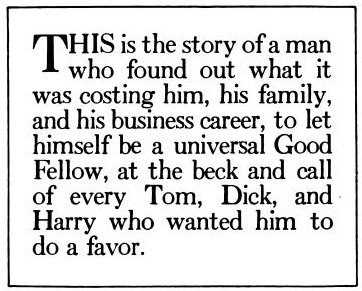mikecanex | Three things were very clear to me in that night of self-examination
five years ago. First: A man’s chief loyalty must be to the woman who
has joined her life to his; to the children who call him father; and to
the business which feeds and clothes and houses them all. In my
easy-going willingness to befriend the world at large, I was sacrificing
my wife, my children, and my employer far more than I was sacrificing
myself. As I look back, I marvel that my wife and the children should
have borne with me as uncomplainingly as they did.
What was true of my family was true of the business as well. I
thought I was being friendly to the customers of the house. As a matter
of fact, I was too often being friendly to the customers at the expense
of the house. It is a common fault in salesmen. They let a thousand
trivial demands on the part of the men to whom they sell take their time
and energy from the business of the men for whom they sell.
Second: I am convinced that indiscriminate charity, whether one gives
money or time — which is life itself — merely pauperizes the
recipients. The business and social world are full of respectable
panhandlers, who will take and take and take, just as long as they can
find anyone to give. I gave to them for years, at the expense of those
who had a far better claim upon my generosity. I am still willing to
help any man who honestly needs help. But as for the strong, perfectly
well, and perfectly capable human beings who have chosen to ride through
the world on someone else’s back, they will have to look for another
beast of burden. They can buy their own theatre tickets, write their own
letters of introduction, make their own hotel reservations, use
somebody else’s office instead of mine for their engagements, and borrow
money from the banks which are in business to lend.
And, finally, I am persuaded that no one ever achieves anything
worth-while in this world unless he has so great a respect for his work
that he compels all other men to respect it. Unless, in a word, he
commands his time. Read the life of a great scientist like Agassiz. Was
he forever at the world’s beck and call? Not for a single day. To
letters inviting him to write, or to lecture for money, he replied that
he had no time for those things. He was the custodian of a certain
number of days — a number far too small for the great task he had laid
out for himself — and he would not be diverted even for an instant.
I was explaining this point of view to a good old aunt of mine one
afternoon and she exclaimed: “But, Joe, it is so selfish for a man to
put his work ahead of everything! It’s unchristian.”
“On the contrary, it is Christian in the very finest sense,” I
replied. “What was it that Jesus said when his parents rebuked him for
his failure to keep his engagement with them on that first journey down
from Jerusalem? ‘Wist ye not that I must be about my Father’s business?’
He demanded. He had work to do — great work and little time in which to
do it. Even He was no exception to the eternal rule that achievement
comes only through the subordination of every power to a great ideal;
and that no man is really obliging who does not first discharge in full his obligations to his work.” Fist tap Dale.



0 comments:
Post a Comment